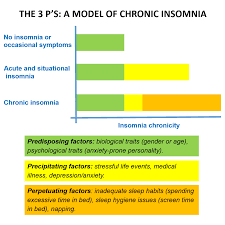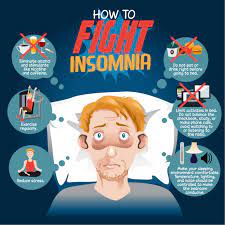The Impact of Chronic Insomnia on Health and Well-being
Chronic insomnia is a common sleep disorder that affects millions of people worldwide. Unlike occasional sleep disturbances, chronic insomnia is characterized by persistent difficulty falling asleep or staying asleep, despite having the opportunity to get a full night’s rest. This condition can have a significant impact on an individual’s health and overall well-being.
Health Consequences of Chronic Insomnia
Chronic insomnia has been linked to a variety of health problems, including:
- Increased risk of developing cardiovascular diseases such as hypertension and heart disease.
- Impaired immune function, leading to frequent illnesses and longer recovery times.
- Higher likelihood of developing mental health disorders such as depression and anxiety.
- Weight gain and metabolic disturbances, increasing the risk of obesity and diabetes.
Effects on Daily Functioning
In addition to its impact on physical health, chronic insomnia can also affect an individual’s daily functioning:
- Impaired cognitive function, including difficulties with memory, concentration, and decision-making.
- Irritability, mood swings, and decreased tolerance for stress.
- Reduced productivity at work or school due to fatigue and lack of focus.
- Social withdrawal and strained relationships with others due to irritability and mood disturbances.
Treatment Options for Chronic Insomnia
Treating chronic insomnia often involves a combination of lifestyle changes, behavioral therapies, and in some cases, medication. Some common treatment options include:
- Establishing a regular sleep schedule and bedtime routine to promote healthy sleep habits.
- Cognitive-behavioral therapy for insomnia (CBT-I), which helps individuals address negative thought patterns and behaviors that contribute to sleep difficulties.
- Relaxation techniques such as deep breathing exercises, meditation, or progressive muscle relaxation to promote relaxation before bedtime.
- In some cases, prescription medications may be prescribed by a healthcare provider to help regulate sleep patterns temporarily.
Conclusion
Chronic insomnia is a serious condition that can have far-reaching consequences for both physical health and overall well-being. If you are experiencing persistent sleep difficulties, it is important to seek help from a healthcare provider or sleep specialist who can provide guidance on effective treatment options. By addressing chronic insomnia early on, individuals can improve their quality of life and reduce the risk of associated health problems in the long term.
9 Effective Tips for Managing Chronic Insomnia
- Establish a consistent sleep schedule by going to bed and waking up at the same time every day.
- Create a relaxing bedtime routine to signal your body that it’s time to wind down.
- Avoid caffeine, nicotine, and alcohol close to bedtime as they can disrupt sleep.
- Make your bedroom conducive to sleep by keeping it dark, quiet, and cool.
- Limit exposure to screens (phones, tablets, computers) before bed as the blue light can interfere with sleep.
- Engage in regular physical activity during the day but avoid intense exercise close to bedtime.
- Try relaxation techniques such as deep breathing or meditation to calm your mind before sleep.
- Consider cognitive-behavioral therapy for insomnia (CBT-I) which has been shown to be effective for chronic insomnia.
- Consult a healthcare professional if chronic insomnia persists for proper evaluation and treatment.
Establish a consistent sleep schedule by going to bed and waking up at the same time every day.
Establishing a consistent sleep schedule is a crucial tip for managing chronic insomnia. By going to bed and waking up at the same time every day, you can help regulate your body’s internal clock and improve the quality of your sleep. Consistency in your sleep routine can signal to your brain when it’s time to wind down and when it’s time to wake up, promoting better sleep patterns over time. This simple yet effective habit can contribute to reducing the symptoms of chronic insomnia and enhancing your overall well-being.
Create a relaxing bedtime routine to signal your body that it’s time to wind down.
Creating a relaxing bedtime routine can be a helpful tip for managing chronic insomnia. By establishing a consistent routine that includes calming activities such as reading a book, taking a warm bath, or practicing gentle yoga stretches, you can signal to your body that it’s time to wind down and prepare for sleep. This routine can help relax your mind and body, making it easier to transition into a restful sleep state and potentially improve the quality of your sleep over time.
Avoid caffeine, nicotine, and alcohol close to bedtime as they can disrupt sleep.
It is recommended to avoid consuming caffeine, nicotine, and alcohol close to bedtime as they can disrupt sleep patterns. Caffeine is a stimulant that can interfere with the ability to fall asleep, while nicotine, a stimulant found in tobacco products, can cause difficulty staying asleep. Alcohol, although initially sedating, can disrupt the sleep cycle and lead to fragmented or poor-quality sleep. By avoiding these substances before bedtime, individuals with chronic insomnia may improve their chances of achieving a more restful and uninterrupted night’s sleep.
Make your bedroom conducive to sleep by keeping it dark, quiet, and cool.
To improve your sleep quality and combat chronic insomnia, it is essential to create a sleep-friendly environment in your bedroom. Make sure your bedroom is conducive to sleep by keeping it dark, quiet, and cool. Blocking out external light sources, minimizing noise disturbances, and maintaining a cool temperature can help signal to your body that it is time to rest and promote a more restful night’s sleep. By optimizing your bedroom environment in this way, you can enhance your chances of falling asleep faster and staying asleep throughout the night.
Limit exposure to screens (phones, tablets, computers) before bed as the blue light can interfere with sleep.
Limiting exposure to screens, such as phones, tablets, and computers, before bedtime is a crucial tip for managing chronic insomnia. The blue light emitted by electronic devices can disrupt the production of melatonin, the hormone that regulates our sleep-wake cycle. By reducing screen time before bed, individuals can promote better sleep quality and improve their chances of falling asleep more easily. Creating a relaxing bedtime routine that does not involve screen usage can help signal to the body that it is time to wind down and prepare for restful sleep.
Engage in regular physical activity during the day but avoid intense exercise close to bedtime.
Engaging in regular physical activity during the day is a beneficial strategy for managing chronic insomnia. Exercise can help regulate sleep patterns, improve sleep quality, and promote overall well-being. However, it is important to avoid intense exercise close to bedtime as it can stimulate the body and mind, making it harder to relax and fall asleep. Instead, opt for gentle activities in the evening, such as yoga or light stretching, to wind down and prepare your body for a restful night’s sleep. By incorporating regular physical activity into your daily routine while being mindful of timing, you can support better sleep habits and alleviate symptoms of chronic insomnia.
Try relaxation techniques such as deep breathing or meditation to calm your mind before sleep.
To alleviate chronic insomnia, incorporating relaxation techniques like deep breathing or meditation before bedtime can be beneficial in calming the mind and promoting a sense of relaxation conducive to sleep. By engaging in these practices, individuals can help reduce stress and anxiety levels, allowing for a smoother transition into a restful state that enhances the likelihood of falling asleep and staying asleep throughout the night.
Consider cognitive-behavioral therapy for insomnia (CBT-I) which has been shown to be effective for chronic insomnia.
Consider cognitive-behavioral therapy for insomnia (CBT-I) as an effective treatment option for chronic insomnia. CBT-I is a structured program that helps individuals address the underlying thoughts and behaviors that contribute to sleep difficulties. Research has shown that CBT-I can be highly effective in improving sleep quality and duration for those struggling with chronic insomnia. By working with a trained therapist to implement CBT-I techniques, individuals can develop healthier sleep habits and overcome the obstacles preventing them from getting restful sleep.
Consult a healthcare professional if chronic insomnia persists for proper evaluation and treatment.
It is crucial to consult a healthcare professional if chronic insomnia persists for proper evaluation and treatment. Persistent sleep difficulties can have a significant impact on one’s health and well-being, and seeking guidance from a healthcare provider or sleep specialist is essential in addressing the underlying causes of chronic insomnia. A thorough evaluation can help determine the most effective treatment options tailored to individual needs, ultimately improving sleep quality and overall quality of life.



